
Earl of Pembroke is a title in the Peerage of England that was first created in the 12th century by King Stephen of England. The title, which is associated with Pembroke, Pembrokeshire in West Wales, has been recreated ten times from its original inception. Due to the number of creations of the Earldom, the original seat of Pembroke Castle is no longer attached to the title.
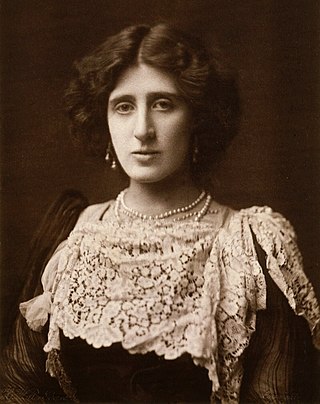
Lady Ottoline Violet Anne Morrell was an English aristocrat and society hostess. Her patronage was influential in artistic and intellectual circles, where she befriended writers including Aldous Huxley, Siegfried Sassoon, T. S. Eliot and D. H. Lawrence, and artists including Mark Gertler, Dora Carrington and Gilbert Spencer.

Sir Philip Sidney was an English poet, courtier, scholar and soldier who is remembered as one of the most prominent figures of the Elizabethan age. His works include a sonnet sequence, Astrophel and Stella, a treatise, The Defence of Poesy and a pastoral romance, The Countess of Pembroke's Arcadia.

Samuel Daniel (1562–1619) was an English poet, playwright and historian in the late-Elizabethan and early-Jacobean eras. He was an innovator in a wide range of literary genres. His best-known works are the sonnet cycle Delia, the epic poem The Civil Wars Between the Houses of Lancaster and York, the dialogue in verse Musophilus, and the essay on English poetry A Defense of Rhyme. He was considered one of the preeminent authors of his time and his works had a significant influence on contemporary writers, including William Shakespeare. Daniel's writings continued to influence authors for centuries after his death, especially the Romantic poets Samuel Taylor Coleridge and William Wordsworth. C. S. Lewis called Daniel "the most interesting man of letters" whom the sixteenth century produced in England.
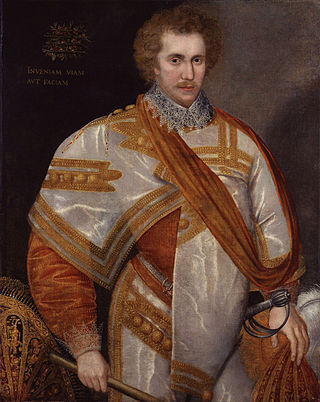
Robert Sidney, 1st Earl of Leicester, second son of Sir Henry Sidney, was a statesman of Elizabethan and Jacobean England. He was also a patron of the arts and a poet. His mother, Mary Sidney née Dudley, was a lady-in-waiting to Queen Elizabeth I and a sister of Robert Dudley, 1st Earl of Leicester, an advisor and favourite of the Queen.
The Fugitives also known as The Fugitive Poets, is the name given to a group of poets and literary scholars at Vanderbilt University in Nashville, Tennessee, who published a literary magazine from 1922 to 1925 called The Fugitive. The group, primarily driven by Robert Penn Warren, John Crowe Ransom, Donald Davidson, and Allen Tate, formed a major school of twentieth century poetry in the United States. With it, a major period of modern Southern literature began. Their poetry was formal and featured traditional prosody and concrete imagery often from experiences of the rural south. The group has some overlap with two later groups Southern Agrarians and New Criticism.
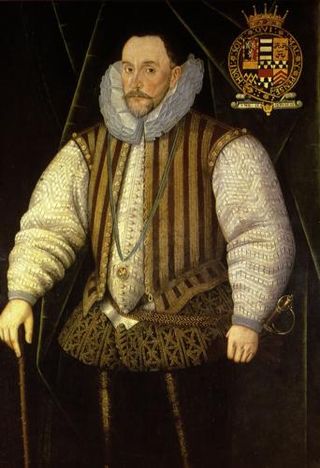
Henry Herbert, 2nd Earl of Pembroke, KG, KB was a Welsh nobleman, peer and politician of the Elizabethan era. He was the nephew of Catherine Parr, and brother-in-law of Lady Jane Grey, through his first wife.
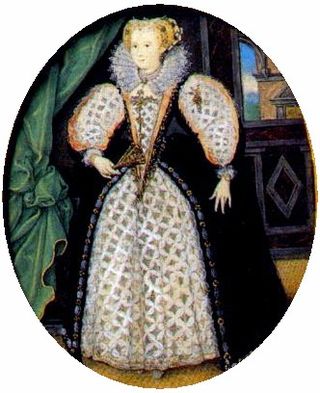
Penelope Rich, Lady Rich, later styled Penelope Blount was an English court office holder. She served as lady-in-waiting to the English queen Anne of Denmark. She was the sister of Robert Devereux, 2nd Earl of Essex, and is traditionally thought to be the inspiration for "Stella" of Sir Philip Sidney's Astrophel and Stella sonnet sequence. She was married to Robert Rich, 3rd Baron Rich and had a public liaison with Charles Blount, Baron Mountjoy, whom she married in an unlicensed ceremony following her divorce from Rich. She died in 1607.

Mary Herbert, Countess of Pembroke was among the first Englishwomen to gain notice for her poetry and her literary patronage. By the age of 39, she was listed with her brother Philip Sidney and with Edmund Spenser and William Shakespeare among the notable authors of the day in John Bodenham's verse miscellany Belvidere. Her play Antonius is widely seen as reviving interest in soliloquy based on classical models and as a likely source of Samuel Daniel's closet drama Cleopatra (1594) and of Shakespeare's Antony and Cleopatra (1607). She was also known for translating Petrarch's "Triumph of Death", for the poetry anthology Triumphs, and above all for a lyrical, metrical translation of the Psalms.

Lady Mary Wroth was an English noblewoman and a poet of the English Renaissance. A member of a distinguished literary family, Lady Wroth was among the first female English writers to have achieved an enduring reputation. Mary Wroth was niece to Mary Herbert née Sidney, and to Sir Philip Sidney, a famous Elizabethan poet-courtier.
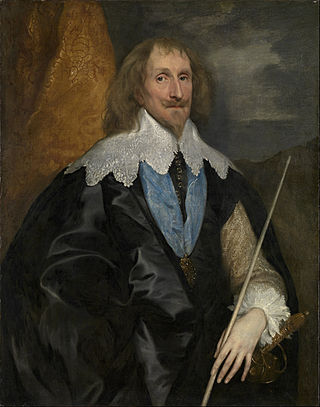
Philip Herbert, 4th Earl of Pembroke and 1st Earl of Montgomery, was an English courtier, nobleman, and politician active during the reigns of James I and Charles I. Philip and his older brother William were the 'incomparable pair of brethren' to whom the First Folio of Shakespeare's collected works was dedicated in 1623.
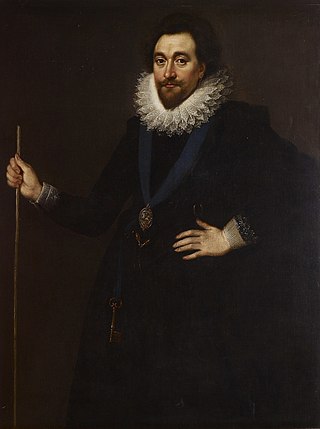
William Herbert, 3rd Earl of Pembroke, of Wilton House in Wiltshire, was an English nobleman, politician and courtier. He served as Chancellor of the University of Oxford and together with King James I founded Pembroke College, Oxford. In 1608 he was appointed Warden of the Forest of Dean, Constable of St Briavels Castle, Gloucestershire, and in 1609 Governor of Portsmouth, all of which offices he retained until his death. He served as Lord Chamberlain from 1615 to 1625. In 1623 the First Folio of Shakespeare's plays was dedicated to him and his brother and successor Philip Herbert, 1st Earl of Montgomery.

Probably composed in the 1580s, Philip Sidney's Astrophil and Stella is an English sonnet sequence containing 108 sonnets and 11 songs. The name derives from the two Greek words, 'aster' (star) and 'phil' (lover), and the Latin word 'stella' meaning star. Thus Astrophil is the star lover, and Stella is his star. Sidney partly nativized the key features of his Italian model Petrarch, including an ongoing but partly obscure narrative, the philosophical trappings of the poet in relation to love and desire, and musings on the art of poetic creation. Sidney also adopts the Petrarchan rhyme scheme, though he uses it with such freedom that fifteen variants are employed.
The Areopagus is a proposed 16th-century society or club dedicated to the reformation of English poetry. The club may have involved figures such as Edmund Spenser, Gabriel Harvey, Edward Dyer and Sir Phillip Sidney. The existence of the Areopagus as a formal society was first noted by Henry Richard Fox Bourne in 1862 in his Memoir of Sir Philip Sidney. There is no direct evidence that the group was more than an idea found in the correspondence between Spenser and Harvey, and if it existed its membership is uncertain.
Wiliam Midleton was a Welsh language poet and adventurer.

"A Defence of Poetry" is an essay by the English poet Percy Bysshe Shelley, written in 1821 and first published posthumously in 1840 in Essays, Letters from Abroad, Translations and Fragments by Edward Moxon in London. It contains Shelley's famous claim that "poets are the unacknowledged legislators of the world".

An Apology for Poetry is a work of literary criticism by Elizabethan poet Philip Sidney. It was written in approximately 1580 and first published in 1595, after his death.

Nathaniel Baxter was an English clergyman and poet. In earlier life tutor to Sir Philip Sidney, and interested in the manner of Sidney's circle in literature and Ramist logic, he became more sternly religious in his opinions. He is now remembered for his 1606 poem Ourania, though not for its poetic merit.

Lady Mary Sidney was a lady-in-waiting at the court of Elizabeth I, and the mother of Sir Philip Sidney and Mary Sidney Herbert, Countess of Pembroke. A daughter of John Dudley, Duke of Northumberland, she was marginally implicated in her father's attempt to place Lady Jane Grey on the English throne and affected by his attainder.
Katherine Dorothea Duncan-Jones, was an English literature and Shakespeare scholar. She was a Fellow of New Hall, Cambridge (1965–1966) and then Somerville College, Oxford (1966–2001). She was also Professor of English Literature at the University of Oxford from 1998 to 2001. She was a scholar of Shakespeare and his contemporaries.















